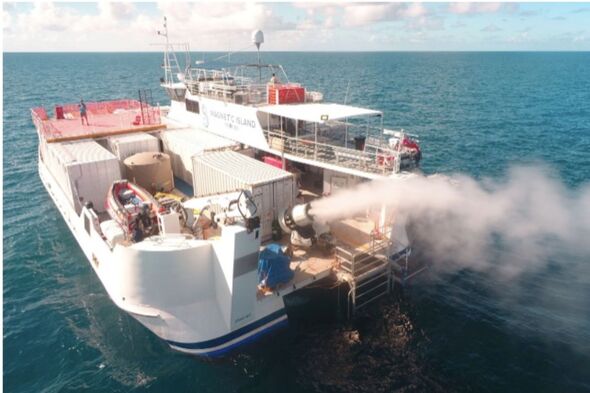UPDATE: A controversial geoengineering initiative aimed at altering weather patterns over the San Francisco Bay has been abruptly halted by city officials, raising urgent questions about the future of solar radiation management research. According to new documents obtained by Politico’s E&E News, the project, led by researchers from the University of Washington, intended to deploy salt water-spraying technology from a retired aircraft carrier to create man-made clouds over an ocean area larger than Puerto Rico.
The experiment, conducted last year in Alameda, lasted only 20 minutes before city officials intervened, citing a lack of prior notification. This ambitious project, funded by a group of billionaires including Chris Larsen, Rachel Pritzker, and Chris Sacca, aimed at a monthslong effort to assess the feasibility of large-scale cloud manufacturing to combat global warming.
The documents revealed that the initiative, with an estimated cost between $10 million and $20 million, sought to expand its operations to other regions, including parts of western North America, Chile, and south-central Africa. The project leaders had hoped to determine whether their cloud-manufacturing instruments could create detectable changes at a scale visible from space.
However, the backlash from city officials has raised significant concerns about transparency and public trust. As Sarah Doherty, the program leader, noted, “The program does not ‘recommend, support or develop plans for the use of marine cloud brightening to alter weather or climate’.” The initial experiment’s secrecy and its quick termination have fueled skepticism and conspiracy theories surrounding solar geoengineering.
Critics argue that such geoengineering practices could disrupt weather patterns, impacting agriculture and wildlife. Recently, Rep. Marjorie Taylor Greene linked geoengineering to severe floods in central Texas, introducing legislation to criminalize the technology. Similarly, Florida Governor Ron DeSantis has signed a law banning the release of chemicals into the atmosphere for climate control.
Despite these challenges, proponents of the initiative contend that the urgency of climate change necessitates continued research into solar geoengineering solutions. “At a time when scientists are facing political attacks and drastic funding cuts, we need to complement a rapid energy transition with more research into a broad range of potential climate solutions,” reported Chris Larsen.
The 2023 research plan outlined that the Alameda project was contingent upon the pilot phase’s success, leading to uncertainty about whether the program will move forward following its abrupt halt. Many experts, including Daniele Visioni from Cornell University, believe that gaining public trust is crucial for any future endeavors in this field.
As the debate around geoengineering intensifies, the implications of this halted experiment extend far beyond the San Francisco Bay area. With more than 575 scientists advocating for a total ban on geoengineering development, the discourse on climate intervention continues to evolve amid mounting political scrutiny.
This developing story highlights the delicate balance between innovation and public perception in tackling one of the most pressing issues of our time: climate change. Readers are encouraged to stay informed as this story unfolds and to share their thoughts on the ethical implications of geoengineering research.
